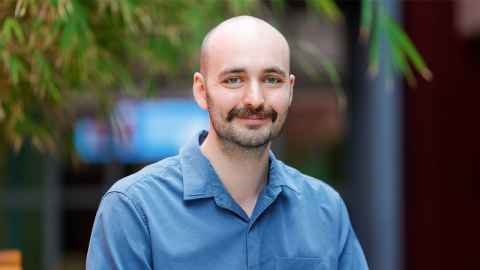PhD research on low-clouds to enhance climate model precision
Hamish Lewis came to Auckland at the beginning of 2019 after completing his undergraduate and honours degrees in Otago.

Hamish is studying for a PhD in Physics, specialising in atmospheric physics, focused on low-clouds, and is set to complete his degree in January 2024.
His research looks at the upstream control of large-scale meteorological variables on low-clouds. That is to say, his research is focused on how lowclouds depend on upstream atmospheric conditions.
Why did you decide to pursue this qualification?
“As part of my honours degree, I took a single atmospheric science paper. It was my favourite paper I had ever taken at university, and I was very interested in learning more, so I chose to pursue a masters, which led to a PhD in this field.”
How does your research relate to climate change?
“Low-clouds are one of the worst-represented physical systems in climate models and are one of the most significant contributors to the uncertainty in climate projections. Incorporating upstream controls into climate models is one possible way to improve low-cloud fields, which could significantly reduce this uncertainty. Whether the global average surface temperature increases by just 2 degrees or 5.5 makes a big difference!”
What inspired you to focus your research on addressing climate change?
“When I first began studying atmospheric physics, I immediately felt that the problems being addressed in the subject were highly important (I guess everyone probably thinks that about their own research), as a better understanding of the climate is invaluable for all aspects of society. The more I continue to research, the more agency I feel I have in addressing problems relating to climate change, which is very fulfilling.”
Can you share any specific accomplishments or milestones you’ve achieved in your research?
“Getting the first paper from my PhD published was a great milestone for me, as it gave me a sense that the things I was researching were worthwhile to the scientific community. I also visited one of my supervisors in Toulouse for a couple of months. The travel was an amazing experience, especially considering I began my PhD in 2020 and had worked through multiple lockdowns in Auckland.”
What are the biggest challenges you face in your work, and how do you address them?
“Initially, just being seen in the research space was a challenge, as there isn’t a group dedicated to low-clouds here in Auckland like in some universities around the world, so I had to put myself out into the international community. My supervisors connected me with some of their collaborators in the field, which provided valuable discussions. I also presented at international conferences, which got my research out there and has connected me with multiple people in the research community.”
What do you like most about the programme and why?
“The self-directed aspect of PhD research is great and difficult simultaneously. I have taught myself so much, learning a lot of the analytical skills I use in my research on my own, and I am becoming a better scientist in the process. However, when things aren’t quite working, it can be a while before you figure them out!”
Where do you hope this qualification will lead you?
“I would like to continue researching as a career, as it’s very interesting and fulfilling, whether that begins in a Postdoctoral position or a research position for a company or government agency.”
Have you received any scholarships?
“I was supported with a Marsden Fund Scholarship, managed by Royal Society Te Apārangi, and a University of Auckland Doctoral Scholarship Extension. This financial support has allowed me to enjoy my studies and my time in Auckland a lot more, and it likely wouldn’t have been possible to pursue my PhD without this support.”
Is there anything else you would like to add?
“I have become friends with many PhD students in the department; I think it’s a good cohort. Although most of us are in different fields, there is definitely great camaraderie and a lot of great people. I also have the utmost respect for my supervisors; they are truly world-class scientists, and I have had an incredible time working with them!”
Finally, tell us something about yourself that we can’t learn by Googling you!
“I love to cook! Life’s too short not to eat the food you love all the time!”
Find out more:
Lewis. H., Bellon. G., and Tra, D. (2023). Upstream large-scale control of subtropical low-cloud climatology.